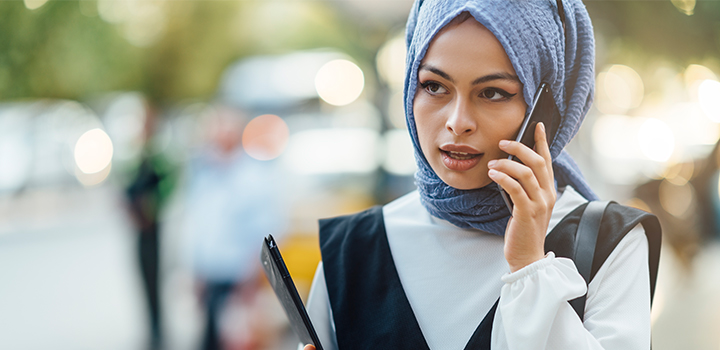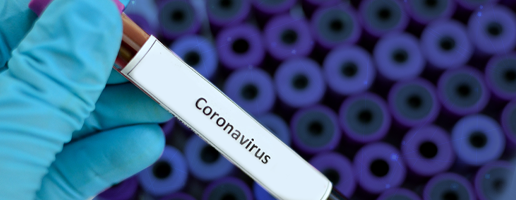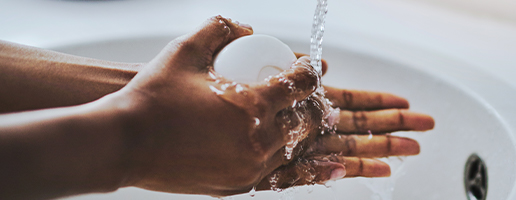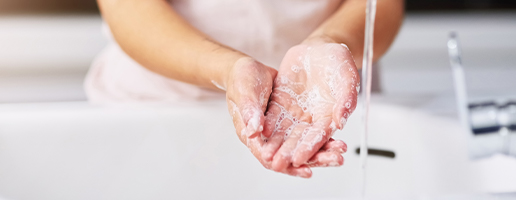14 ways in which COVID-19 is changing daily life

Globally, governments have enforced unprecedented measures aimed at containing the spread of COVID-19. These measures affect every aspect of daily life. Here are 14 ways in which your daily life could change.
For many people the world over, the arrival of COVID-19 has changed daily life in tangible ways. On 15 March 2020, President Ramaphosa declared a national state of disaster in South Africa in relation to COVID-19.
As the outbreak of COVID-19 continues to spread across the world, containment measures are becoming more important. Social distancing is one way help stop the virus spreading and "flattening the curve". We encouraging the use of virtual consultation services to ensure people can follow recommended guidelines on social distancing.
"Governments and health authorities are doing everything they can to curtail the spread of this virus," says Dr Noluthando Nematswerani, Discovery Health's Head of the Centre for Clinical Excellence. "Our President has advised the nation of the serious measures now in place in South Africa to curb the local spread of COVID-19. These much-needed containment measures have brought massive disruption to education, working arrangements, child care, healthcare, travel, everyday living and business operations, with broader effects on economic growth that are a real cause for concern."
- Remember that the virus spreads mostly by means of droplets (from coughing or sneezing) and it can survive for a few hours or up to several days on people's hands, or on any surface.
- A new study published by the New England Journal of Medicine suggests that the virus could disintegrate over the course of a day on cardboard, can live on plastic and steel for up to three days, but when suspended in droplets in the air, it can stay this way for up to half an hour, before drifting down and landing on surfaces where it can linger for hours.
COVID-19: 14 new daily realities
These are 14 new ways of doing things to curb the spread - "flattening the curve" - of COVID-19:
- We're washing our hands for 20 seconds - and we're not shaking them. The virus that causes the COVID-19 is spread when we touch an infected surface or object with our hands, and then touch our faces. Most of us touch our faces very often without even being aware of this. That's why shaking other people's hands and hugging people is obviously no longer a good idea. Nod or wave - and practise social distancing.
- We've stopped kissing people. The WHO's advice around maintain social distancing refers to staying at least one metre away from other people, especially if they're ill, coughing or sneezing. Greeting people with a kiss won't be the thing to do for a while - at least until this virus runs its course.
- We're schooling at home and online. In several countries - South African included - schools have been closed to stop the spread of the virus, because it is easily transferred where many people gather in confined spaces such as classrooms or even playgrounds. Sharing of books, stationery, toys and sporting equipment also increases the risk of transmission. We're keeping our children at home for a while and home schooling them or helping them to join in on online, digital learning channels.
- We're staying home. If you're used to going to the cinema, sports arenas, the theatre or music concerts, get used to the thought of home entertainment. In many countries, including South Africa, large gatherings have been banned. In Austria, gatherings of over five people are disallowed. Restaurants, clubs and pubs in many countries have been closed as a precautionary measure. In Johannesburg, for example, the City of Johannesburg has strongly encouraged bars, nightclubs, taverns, restaurants, cinemas and other areas of public entertainment to immediately cease operations and limit themselves to providing off-premise consumption.
Executive Mayor of the City of Johannesburg, Geoffrey Makhubo says: "We encourage residents to be responsible, resilient and to not undermine the potential impact a widespread and rapid infection rate of the virus could have on the residents of the City and our economy. We must, immediately and without second-thoughts, amend our daily routines, forego unnecessary travel, avoid restaurants and other places of entertainment, take due care for our personal hygiene and be vigilant to signs of infection and symptoms."
- We're postponing of elective medical treatment. Medical facilities will find themselves under increasing pressure as the virus continues to spread. Elective surgery, or treatment and medical procedures that are not essential may have to wait.
- Quarantine at home for those who acquire COVID-19. Across the world, many people who've developed COVID-19 have been put into home-based quarantine. This means staying put, in one area of the house ideally - away from everyone else for the entire quarantine period. It means doing everything in your power not to transmit the virus to the other people who live with you. The reality of this could translate into being confined to one room and using a separate bathroom, if there's one available. It also means not sharing utensils, linen or towels.
- Read more about self-isolation and caring for someone with COVID-19 in these guidelines from the Victoria State Government Health and Human Services in Australia.
- We're working remotely. Large open offices with shared equipment, bathrooms and office kitchens could create ideal conditions for the spread of the virus. That's why many local and international businesses have their employees working from home and doing meetings virtually. Not all work can be done remotely, though, and this poses a serious threat to the viability of many businesses. Commuting on public transport also increases the risk of transmission and employees who work from home avoid this.
- We're not touching handles, buttons and doorknobs. We're so used to touching taps and handles and things such as ATM buttons. While cleaning schedules may increase in some public spaces - to disinfect door handles, stair railings, lift buttons and escalator handrails much more regularly - we must use caution and practise preventive habits when out and about. If you absolutely have to touch something, put a tissue over your hand, or wear gloves. If you can't do this, wash your hands immediately afterwards and don't touch your face at any stage. Also wash your hands after handling cash.
- We're relying more on online shopping and home deliveries. Shopping trolleys, baskets, supermarket shelving, fridges and pay points can all harbour the virus that causes COVID-19. Shop online and get things delivered to you rather than going to the shops. Doing so reduces your chances of acquiring COVID-19 or passing it on to someone else.
- We're causing goods shortages. South Africans, concerned that the impact of COVID-19 could cause shortages in local stores, have been stockpiling groceries and household commodities, leading to shortages in the shops. However, doing so reduces access to food and other items for people who are financially vulnerable. A balance needs to be found between preparedness and panic-buying. Manufacturers might experience disruption in their supply chains, and they could experience lower productivity if many employees are not at work, resulting in fewer items on the shelves.
- We're wearing masks and gloves. If you've acquired COVID-19, a mask could stop you from spreading the virus that causes COVID-19 to other people. A mask is not effective in stopping you from getting the disease, because transmission comes mostly from people touching their faces after touching an infected surface or inhaling droplets exhaled by an ill person. The World Health Organization advises healthcare employees to wear a mask only if they're taking care of someone suspected of having COVID-19. Gloves could also stop you spreading the virus. Wear disposable gloves, though, and get rid of them once you've used them to prevent spreading any viral illness you come into contact with further.
- We're opting for tele-consultations and virtual consultations with our doctors. The health authorities advise against visiting your GP unannounced if you suspect you may have COVID-19. You could infect other patients or healthcare workers. Phone the doctor or do a virtual consultation with them. If you need to be tested, healthcare workers who are warned in advance of your arrival can take precautions and give you the right care and support.
- We're opting for online communication rather than face-to-face visits. Skype chats, FaceTime and phone calls will, for a while, be more popular than face-to-face visits. Someone who has acquired COVID-19 should have reduced contact with other people anyway. Call them, support them, but don't visit them.
- We're cancelling air travel and holidays. Many countries have closed their borders and countless flights have been cancelled. President Ramaphosa has advised against any unnecessary travelling for South Africans. Some destinations have also experienced high levels of cancellations, and movement from and into certain cities and countries has been restricted.
These measures, though inconvenient and costly in the short term, could go a long way to keeping people healthy. Never before has the modern world faced a crisis such as COVID-19. On our side, though, we have good communication networks, scientific knowledge and research, access to correct information, know-how on good hygiene practices, and people uniting everywhere to defeat this virus and the disease that it causes, together.
ALL MEDICAL INFORMATION FOUND ON THIS WEBSITE INCLUDING CONTENT, GRAPHICS AND IMAGES, IS FOR EDUCATIONAL AND INFORMATIONAL OBJECTIVES ONLY. DISCOVERY HEALTH PUBLISHES THIS CONTENT TO HELP TO PROTECT AND EMPOWER ALL SOUTH AFRICANS BY PROMOTING A BETTER UNDERSTANDING OF COVID-19.
Find a healthcare professional near you
Find a doctor or hospital near you online or by using the Discovery app.
Related articles

Outbreak of the 2019 novel coronavirus
The 2019 novel coronavirus (2019-nCoV) has caused an outbreak of fatal respiratory illness first detected in Wuhan, China. This is a completely new strain with no vaccines available. The best way to prevent infection is to avoid being exposed to this virus.

Understand the Novel Coronavirus (COVID-19) and prevent infection
No country is immune to the spread of the Novel Coronavirus - officially named COVID-19 by the World Health Organization (WHO). The outbreak has reached pandemic proportions and been declared a global public health emergency.

Novel Coronavirus - wash your hands of the threat
As toddlers, we learnt to wash our hands. But, did we ever master the skill to the extent that is needed to wash pathogens off our hands, and save lives? Multiple studies show people don't wash their hands at the right times, in the right way or for the right amount of time. We contaminate the things and people we touch with the germs we carry on our hands.